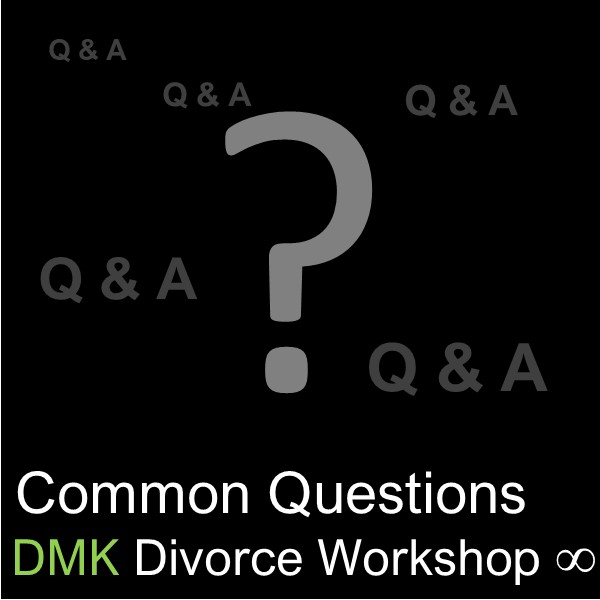Divorce Questions
How long does it take to complete a divorce?
The average time frame is one year, but can vary a great deal based on your individual circumstances.
Are the laws the same in every state?
No. Consult a local attorney to explain the laws specific to your state and the types of divorce available.
Can I remain a co-owner of my home even though I move out?
If your spouse agrees and there are no extenuating circumstances this can usually be part of the settlement. However, you should understand how Capital Gains tax may affect you in the future.
Can I date someone I met when separated without it being considered adultery?
Legally, this is very specific to your case so you should consult your attorney. However, if you are legally separated, many states do not consider it adultery if the relationship began after the legal separation. However, if the physical relationship could be proven as the cause of the end of the marriage (meaning it started before the separation) it could be considered otherwise. The relationship may also make your spouse less cooperative in the settlement negotiations. If it goes to court, it may also affect the judge's opinion, in your spouses favor. Ethically, it is purely subjective.
Do we have to get legally separated to get a divorce?
In many states, there is a requirement to first obtain a legal separation before you can proceed with divorce. What constitutes a legal separation varies state-to-state. Also, each state with these requirements has guidelines of the separation period.
A legal separation usually includes a separation agreement. In most jurisdictions, the marital separation agreement may still be effective even if it is not filed - though many states require it be notarized. The separation agreement often includes things like: support, residency and parenting plan inclusive of temporary custody arrangements while separated. Usually, the separation agreement is what the final divorce settlement is based upon with revisions each spouse agrees upon or judge orders.
The separation time frame is often helpful in working out some of the "bugs" of the original separation agreement so that the long-term divorce settlement is most fitting to the couples needs.
Do I have to have my own attorney?
No. You can share an attorney with your spouse. Otherwise, in most states, you can complete and file your own paperwork without legal representation. Check with your local family court clerk to see if this is possible in your state.
Can I just hire an attorney to do my paperwork?
It's based on the laws in your state and the attorney, but usually there are legal services and attorneys who offer this service for a discounted rate (usually less than $1,000). However, this assumes you and your spouse can do most of the negotiating without the assistance of mediators, arbitrators or attorneys to aid you. If your case is complicated or relationship too fractured, it may be best to go the traditional route.
Is it true that half of all marriages end in divorce?
While statistics vary between 40-50% of marriages end in divorce, there are a variety of factors that affect that figure. Many sources dispute the accuracy of "half of all marriages end in divorce" based on multiple factors. One is that the percentage is based on annual marriages vs. annual divorces rather than tracking marriages over a period of time to determine their success rate. Considering multiple sources, DMK editorial staff upholds the percentage [40-50%] is the closest and most accurate percentage portion possible. More specific percentages are currently unsupported by statistics and current data.
Should I wait to file my taxes until my divorce is final?
Consult a local tax attorney or www.irs.gov regarding tax questions as they relate to your specific circumstances. There are a great deal of factors that affect the answer to that question. General tax information is listed on the sidebar of our Legal Guide section.
What if we can not decide who gets custody of our children while we are going through the divorce process?
In many states, a hearing may establish these terms while the divorce is being processed if you and your spouse can not come to an agreement. You can still negotiate all other terms of the divorce and only have this issue go before a judge to save on legal expenses.
A temporary order will be in place until the final agreement is established. The temporary order will stay in effect unless it is modified or the case discontinues. While the temporary order is not permanent it may be used as a basis to establish terms in the final agreement. The temporary order may not be exactly the same as the judges final order regarding the final settlement agreement.
Should I remove my spouse and child from my health insurance plan from work before or after the divorce?
Wait until after the divorce to remove them and make sure that is what they want. Usually such a change would be made the first month following the signed settlement. Otherwise, you could be responsible for some or all medical expenses incurred prior to the end of the divorce.
Also, your spouse may elect to keep the same insurance after the divorce regardless if he/she is required to pay for premiums and/or other healthcare costs. Federal law allows for employee covered healthcare for former spouses for 36 months following a divorce. But there are usually additional premiums and the employee must notify their benefit's manager prior to the divorce and within the set period of time as required by the employer benefit's program. There are exceptions, so contact your human resources department for details and your attorney for guidance, as soon as possible.
